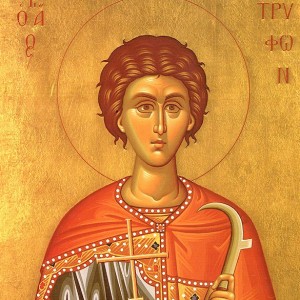We are reminded many times in Holy Scripture and in the witness of the saints that the Christian way of life is for all people and that God makes no distinctions among his children. There is neither rich nor poor, high or low estate, “neither slave nor free, there is neither male nor female; for [we] are all one in Christ Jesus.” [Galatians 3:28]
Even a humble gardener can receive the heavenly reward of sainthood, as we see in the story of St. Phocas, who lived in the Black Sea port of Sinope near the gates of the city. He was a holy hermit – living alone and spending his time in prayer and in tending a garden near his cottage. Phocas also had a vocation for hospitality. Whenever anyone entered the city, they were greeted by him, and he offered them some of the fruits of his labors from his garden and a place to rest in his house. Visitors rarely received material sustenance only, for Phocas was a devout Christian and was anxious to share with others, in his simple language, the good news of Christ our Savior.
But even this seemingly insignificant member of society could not escape the vicious persecution that the Emperor Diocletian imposed on Christians. Soldiers were sent to Sinope with orders to execute the known Christians, Phocas among them. When they arrived at the gate of the city near dark, the hermit greeted them in his usual fashion and offered them hospitality. The soldiers were grateful for this kind gesture and enjoyed a good meal from the hermit’s garden. They told him the purpose of their visit to this city and who they were looking for. Did the hermit know the whereabouts of the “criminal” Phocas? Their host told them that, in the morning – after they had had a good night’s rest – he would tell them where to find the man.
All that night, as the soldiers slept, Phocas dug in his garden until he had carved a hole large enough for a grave. In the morning, when the soldiers were thanking him for his hospitality, Phocas revealed to them that he was the man they sought. At first, they were shocked and begged the hermit to recant his beliefs so that they could release him. But Phocas told them how Christ had died for us and that he would never deny Him. Showing them the grave that he had prepared, he declared that he would be willing to share in our Lord’s sufferings and die for Him. It was with great reluctance that the soldiers carried out their orders and beheaded Phocas, who received the martyr’s crown around the year 320.
The story of the humble gardener’s kindness to his executioners and his courage in the face of death spread, and now, as pilgrims came to visit his grave at the gate of the city, many miracles were reported. One of Christ’s lowliest followers was recognized as a saint of God. We celebrate the witness of St. Phocas on July 3.
I had rather be a door-keeper in the house of my God, than to dwell in the tents of ungodliness. [Psalm 84:11]
